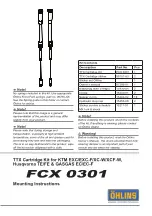
12.1
Cooling water
An applicable treatment is used to give the cooling water the correct properties that prevents
service problems. Cooling water that has not had treatment can soon cause problems in the
cooling system (eg corrosion, sediment or hard particles).
12.1.1
Raw water for cooling water
The raw water for cooling water has to obey the WinGD specifications, refer to
.
Tab 12-1
Specifications for raw water
Parameter
Value
Test method
pH, (see Note)
6.5 to 8.5
ASTM D 1287 or D 1293
Hardness
Maximum 10°dH
ASTM D 1126
Chlorides (Cl
-
)
Maximum 80 mg/l
ASTM D 512 or D 4327
Sulphates (SO
4
2-
)
Maximum 150 mg/l
ASTM D 516 or D 4327
NOTE:
For reverse osmosis technologies, the minimum pH value is 6.0.
If you think there is a problem, you must do an analysis of the raw water and send the results to
WinGD to get advice.
For the raw water WinGD recommends as follows:
•
Fully desalinate the raw water before you fill it into the system.
•
You can use condensate water (eg from the fresh water generators or from auxiliary steam
systems), but it must have additives. Condensate water is highly corrosive and must have
corrosion inhibitors to prevent problems.
•
Use potable water or process water from the local mains only as a last option for a short
period. The hardness of this water must not be more than 10°dH (German hardness
degrees). If the hardness is more than this limit, you must decalcify the water to the given
value.
•
Do not use sea water as raw water. Sea water has a high salt content and causes damage
to the cooling water system.
Corrosion protection oils (emulsion oils) are not recommended for the treatment of the cooling
water. If instructions about the use of corrosion protection oils are not obeyed and coolant checks
are not sufficient, then water / oil emulsion can occur. This can cause the cooling system to become
clogged.
X52
AA00-0000-00AAA-030C-A
Operation Manual
Cooling water
Winterthur Gas & Diesel Ltd.
- 440 -
Issue 002 2018-11
















































